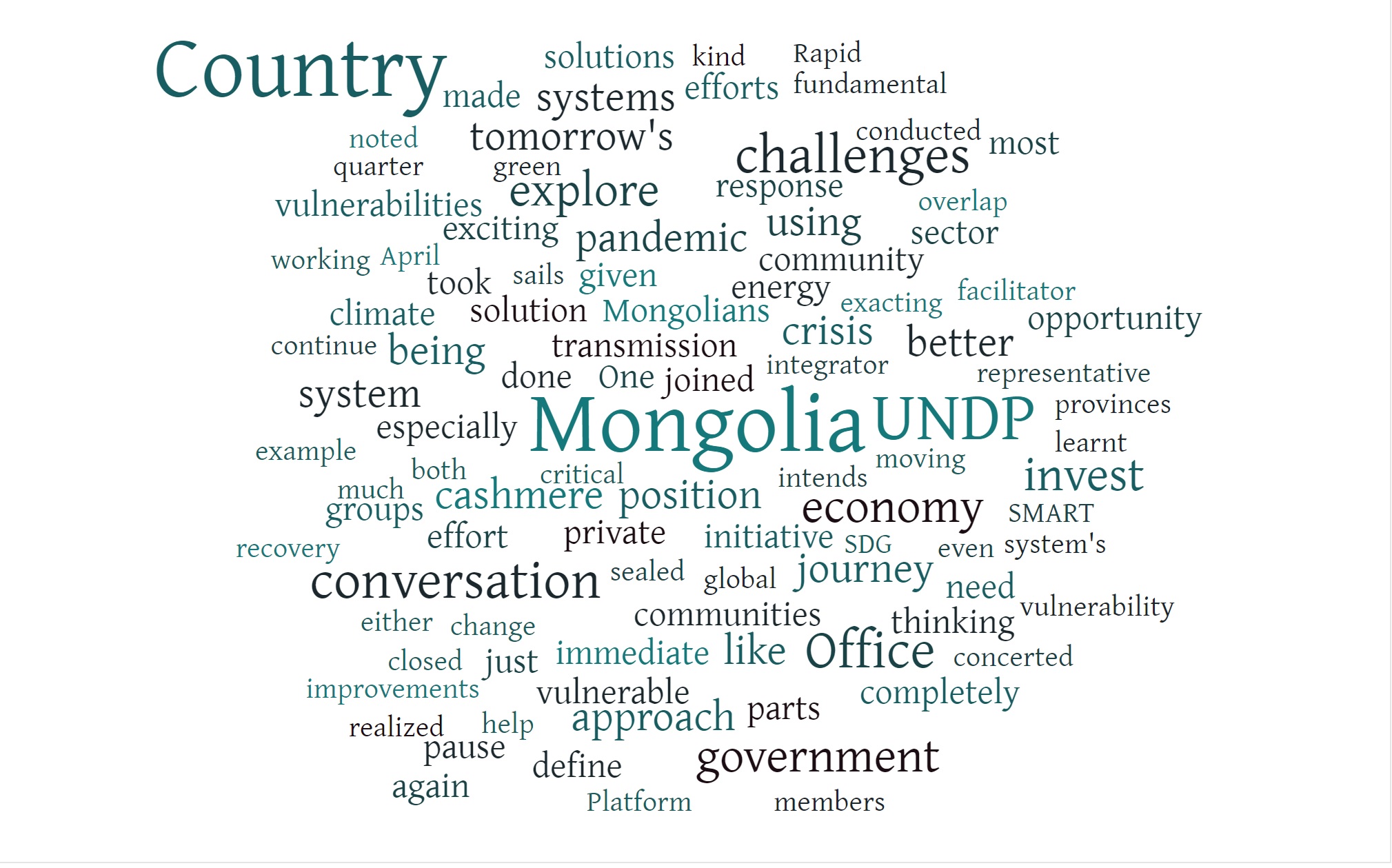Nashida Sattar, Deputy Resident Representative, UNDP Mongolia
June 2020
When I joined UNDP Mongolia in October 2019, the Country Office already had embarked on a Transformational Journey to explore how UNDP in Mongolia could be more efficient in assisting the government in addressing the complex development challenges it faces using a systems approach, moving beyond projects. UNDP in Mongolia felt it was time to be a solution facilitator instead of just a solution provider.
Using a systems thinking approach was not new to the country or the UNDP Country Office. At the national level for example, efforts were being made to address complex challenges such as traffic congestion and air pollution in the city. At the provincial levels, efforts were being made to explore SMART city approaches using system thinking. The Country Office has also just rolled out the Sustainable Cashmere Platform- an exciting initiative to position Mongolia as a global leader in sustainable cashmere by bringing herder groups, government and the private sector together to work for solutions.
It was exciting to join these conversations. Colleagues discussed the thematic areas we should explore. Should it be the energy crisis, which is fundamental to Mongolia especially given its vulnerability to climate change, or should it be e-governance which is critical given the geographical challenges faced in providing services to this country?
And then the pandemic hit us!
The government took immediate action and closed schools and banned public meetings end of January. In February and March, it closed its border and halted all commercial flights in and out of the country, which are still in effect. This has prevented community transmission and helped to seal off the virus from infecting the population. Due to the exacting climate and its harsh winters, Mongolian communities say they are used to being sealed off. One of our external groups members who has joined us in this journey said, “nomadic cultures like Mongolians have survived because we have learnt to survive even when we are completely isolated.” Nevertheless, the impact on the population is significant.
A Rapid Socio-Economic Assessment of COVID-19 prevention measures on vulnerable groups conducted by UNDP in April 2020, demonstrated marginalized and vulnerable communities took the immediate brunt as existing vulnerabilities and challenges were reinforced. This is once again a clear indication that these vulnerabilities and challenges overlap and are multidimensional. It started as a health crisis to be avoided and yet, in Mongolia with no community transmission the impact is most acutely felt economically and psycho-socially, particularly for women.
As the prevention measures employed by Mongolia kept the virus at bay, this has allowed us time to pause, to question if we can continue as we have done and ask if our systems are working. If not, this is the time to try and recalibrate. The UNDP Administrator Achim Steiner noted, “it’s a kind of a fork in the road for every country. You have an opportunity to either invest in returning to yesterday’s economy or to invest in tomorrow’s economy.”1)
The Country Office realized we have an opportunity to facilitate a conversation that would help invest in tomorrow’s economy for Mongolia. One that is ‘better’ ‘green’, ‘equal’ and ‘sustainable’. And so, after a pause, having adjusted our sails, we are off again continuing our transformation journey, but with a new horizon in mind. We have constituted a reference group to explore both what the pandemic has done to the country, especially to the most vulnerable and how we can better define what we need to focus on to invest in tomorrow’s economy. It brings together select representatives from the government, NGOs, and the private sector. They represent the urban centers and the provinces. Our group has gender balance, with experts on energy, digitalization, and cashmere.
This initiative is not without its ambitions. We have initiated a conversation in Mongolia on what would post pandemic Mongolia look like; what present initiatives might be accelerated, what parts of the system would be better served with targeted improvements and what parts of the system need to be completely rethought. UNDP leveraging its SDG integrator role is in an ideal position to facilitate this conversation, and to ensure the solutions generated are woven into the recovery and the response, building a better future – for all.

 Locations
Locations



